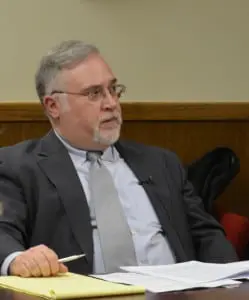Counsel on complex local issues drives outcomes
By Kevin E. Foley
When the idea of locating a Dunkin’ Donuts franchise at a Chestnut Avenue service station was first introduced to the Cold Spring Planning Board in spring 2012 it is fair to say a majority of members were highly skeptical it was the right fit for the village. At the outset members referred to the newly minted Comprehensive Plan and wondered aloud whether a fast food national chain operation was consistent with the spirit if not the letter of the plan.

Not everyone agreed. At least one member questioned how far the board could go in deciding the appropriateness of allowing a Dunkin’ Donuts given the property owner’s rights, the existence of other stores that could arguably be called chain operations and the absence of definitive language in the Comprehensive Plan as to the issue of franchise stores. The board decided to seek legal counsel from then Village Attorney Stephen Gaba.
After Gaba, a partner at the Orange County firm of Drake, Loeb, Heller, Kennedy, Gogerty, Gaba and Rodd, opined it was evident the board’s wings had been clipped. No more further remarks were made about possible damage to the village’s character or interpretations of the Comprehensive Plan’s meaning as applied to the situation. Traffic flow and other site-specific impact issues moved center stage. Eventually the board unanimously approved the plan.
At the time of Gaba’s opinion The Paper made a Freedom of Information Law (FOIL) request to see the letter. As village attorney, Gaba ruled his letter was protected by attorney-client privilege. More than two years later, with the Dunkin’ Donuts under construction, the current Village Attorney informally ruled the letter stays private after The Paper inquired.
As much as anyone lawyers have great influence on the complex process of handling large-scale building projects that are proposed within a governmental jurisdiction. The process involves adherence to state, federal and county laws governing developments and the review process. When the jurisdiction is small, with limited resources, the lawyers’ influence can grow even larger.

On Sept. 17, a majority of the Cold Spring Planning board challenged their lawyer on whether they could still examine the mass and scale of the proposed Butterfield development as they begin a site plan review.
The lawyer, Anna L. Georgiou, an associate with the Westchester- and New York City-based firm of Wormser, Kiely, Galef and Jacobs, explained to them several times that the Village Board’s trustees had limited their scope when they passed a special new zoning law for the site of the buildings. (See Sept. 19 story.)
To varying degrees members argued or questioned what exactly the trustees intended. A consensus was clearly forming around formally asking the trustees to explain their original intent.
As the discussion continued, Planning Board Chairman Barney Molloy pointed out to his colleagues that the best person to ask what the trustees intended in drafting the zoning law “is sitting here before us.” Georgiou was also retained by the trustees to advise and craft the new legislation. In effect she served as counsel to the Planning Board in asking for broader authority to examine the Butterfield project, then served as counsel for the trustees in denying the request.
Best practice
The Planning Board is an appointed body ultimately subject to the authority of the elected trustees so Georgiou was not in a conflicted situation and her dual appointment was known by all. But given the Planning Board member’s befuddlement over what had transpired between the two bodies and the stakes involved, it leaves open the question of whether having the same counsel on both ends was best practice. Georgiou is said to be under consideration as counsel for the newly appointed village zoning commission.

Before the Planning Board members in favor of making an inquiry could act, Molloy suggested they might want to meet privately with Georgiou and seek her counsel on the best way to proceed. Although no formal motion was made to do so no member objected and no one offered an explanation as to why it was necessary to discuss the matter out of earshot of media, audience and the official record.
Underscoring the weight of the issue and an insight into the legal considerations, an exasperated developer Paul Guillaro stood and declared that he would not bear the expense of any legal review of what he understood to be a settled legal matter. The developer is generally responsible for costs associated with the review of the project.
After a 45-minute presumably lively discussion, the Planning Board returned to the public meeting and said no more about the mass and scale of the project. Instead they voted to proceed with the site plan review without further ado. No reference was made to the substance of their private deliberation.
In both the case of Gaba’s advisory letter and Georgiou’s private meeting with the Planning Board, the shield of attorney-client privilege prevails, according to conversations with two lawyers with experience in government deliberations and also confirmed with Robert Freeman, chairman of the New York State Committee on Open Government. But all the lawyers acknowledged that the issue of who is the ultimate client, namely the citizens of the jurisdiction, compels those providing counsel to act and provide advice that is in the public interest.
Freeman also affirmed that in the case of Gaba’s letter or other written legal advice that effects decision making the Cold Spring Board of Trustees could waive the privilege and make the Gaba letter public to better inform citizens.


Ben Franklin: “A countryman between two lawyers is like a fish between two cats.”
An old-timer near where I grew up in rural Vermont echoed this, explaining that there was a lawyer in town that had no business at all. A second one moved in, and they were both busy. Nice.